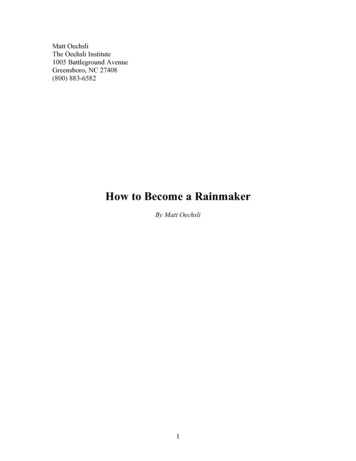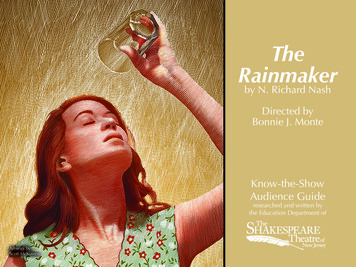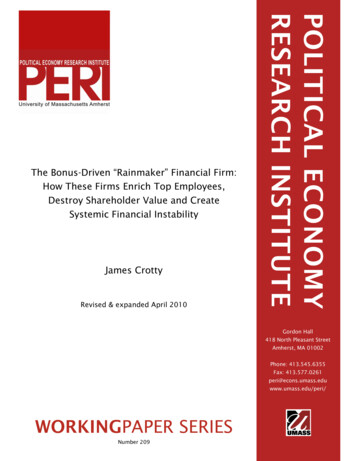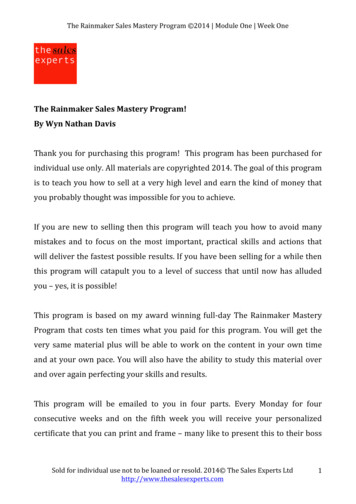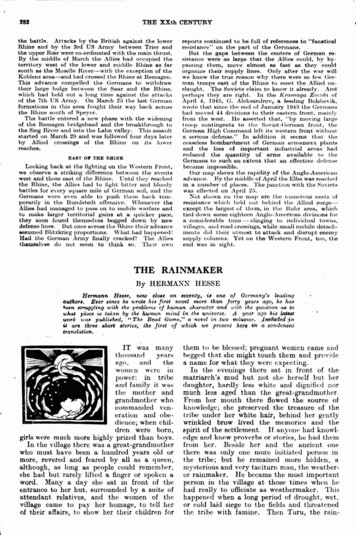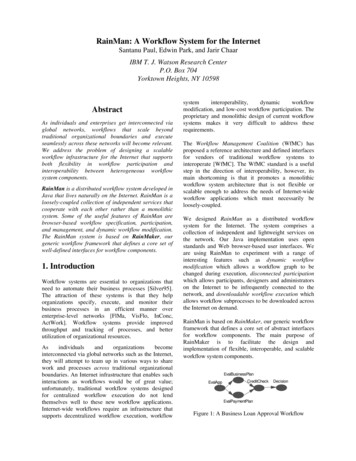
Transcription
The RainmakerJohn GrishamOneMY DECISION TO BECOME A LAWYER was irrevocably sealed when I realized myfather hated the legal profession. I was a young teenager, clumsy, embarrassed by myawkwardness, frustrated with life, horrified of puberty, about to be shipped off to amilitary school by my father for insubordination. He was an ex-Marine who believedboys should live by the crack of the whip. I'd developed a quick tongue and an aversionto discipline, and his solution was simply to send me away. It was years before I forgavehim.He was also an industrial engineer who worked seventy hours a week for a company thatmade, among many other items, ladders. Because by their very nature ladders aredangerous devices, his company became a frequent target of lawsuits. And because hehandled design, my father was the favorite choice to speak for the company indepositions and trials. I can't say that I blame him for hating lawyers, but I grew toadmire them because they made his life so miserable. He'd spend eight hours hagglingwith them, then hit the martinis as soon as hewalked in the door. No hellos. No hugs. No dinner. Just an hour or so of continuousbitching while he slugged down four martinis then passed out in his battered re-cliner.One trial lasted three weeks, and when it ended with a large verdict against the companymy mother called a doctor and they hid him in a hospital for a month.The company later went broke, and of course all blame was directed at the lawyers. Notonce did I hear any talk that maybe a trace of mismanagement could in any way havecontributed to the bankruptcy.Liquor became his life, and he became depressed. He went years without a steady job,which really ticked me off because I was forced to wait tables and deliver pizza so Icould claw my way through college. I think I spoke to him twice during the four years ofmy undergraduate studies. The day after I learned I had been accepted to law school, Iproudly returned home with this great news. Mother told me later he stayed in bed for aweek.Two weeks after my triumphant visit, he was changing a lightbulb in the utility roomwhen (I swear this is true) a ladder collapsed and he fell on his head. He lasted a year in acoma in a nursing home before someone mercifully pulled the plug.Several days after the funeral, I suggested the possibility of a lawsuit, but Mother wasjust not up to it. Also, I've always suspected he was partially inebriated when he fell. Andhe was earning nothing, so under our tort system his life had little economic value.
My mother received a grand total of fifty thousand dollars in life insurance, andremarried badly. He's a simple sort, my stepfather, a retired postal clerk from Toledo, andthey spend most of their time square dancing and traveling in a Winnebago. I keep mydistance. Mother didn't offer me a dime of the money, said it was all she had to face thefuture with, and since I'd proven ratheradept at living on nothing, she felt I didn't need any of it. I had a bright future earningmoney; she did not, she reasoned. I'm certain Hank, the new husband, was filling her earfull of financial advice. Our paths will cross again one day, mine and Hank's.I will finish law school in May, a month from now, then I'll sit for the bar exam in July. Iwill not graduate with honors, though I'm somewhere in the top half of my class. Theonly smart thing I've done in three years of law school was to schedule the required anddifficult courses early, so I could goof off in this, my last semester. My classes this springare a joke-Sports Law, Art Law, Selected Readings from the Napoleonic Code and, myfavorite, Legal Problems of the Elderly.It is this last selection that has me sitting here in a rickety chair behind a flimsy foldingtable in a hot, damp metal building filled with an odd assortment of seniors, as they liketo be called. A hand-painted sign above the only visible door majestically labels the placeas the Cypress Gardens Senior Citizens Building, but other than its name the place hasnot the slightest hint of flowers or greenery. The walls are drab and bare except for anancient, fading photograph of Ronald Reagan in one corner between two sad little flagsone, the Stars and Stripes, the other, the state flag of Tennessee. The building is small,somber and cheerless, obviously built at the last minute with "a few spare dollars ofunexpected federal money. I doodle on a legal pad, afraid to look at the crowd inchingforward in their folding chairs.There must be fifty of them out there, an equal mixture of blacks and whites, average ageof at least seventy-five, some blind, a dozen or so in wheelchairs, many wearing hearingaids. We were told they meet here each day at noon for a hot meal, a few songs, anoccasional visit by a desperate political candidate. After a couple of hours ofsocializing, they will leave for home and count the hours until they can return here. Ourprofessor said this was the highlight of their day.We made the painful mistake of arriving in time for lunch. They sat the four of us in onecorner along with our leader, Professor Smoot, and examined us closely as we picked atneoprene chicken and icy peas. My Jell-O was yellow, and this was noticed by a beardedold goat with the name Bosco scrawled on his Hello-My-Name-Is tag stuck above hisdirty shirt pocket. Bosco mumbled something about yellow Jell-O, and I quickly offeredit to him, along with my chicken, but Miss Birdie Birdsong corralled him and pushed himroughly back into his seat. Miss Birdsong is about eighty but very spry for her age, andshe acts as mother, dictator and bouncer of this organization. She works the crowd like aveteran ward boss, hugging and patting, schmoozing with other little blue-haired ladies,laughing in a shrill voice and all the while keeping a wary eye on Bosco, who
undoubtedly is the bad boy of the bunch. She lectured him for admiring my Jell-O, butseconds later placed a full bowl of the yellow putty before his glowing eyes. He ate itwith his stubby fingers.An hour passed. Lunch proceeded as if these starving souls were feasting on sevencourses with no hope of another meal. Their wobbly forks and spoons moved back andforth, up and down, in and out, as if laden with precious metals. Time was of absolutelyno consequence. They yelled at each other when words stirred them. They dropped foodon the floor until I couldn't bear to watch anymore. I even ate my Jell-O. Bosco, stillcovetous, watched my every move. Miss Birdie fluttered around the room, chirping aboutthis and that.Professor Smoot, an oafish egghead complete with crooked bow tie, bushy hair and redsuspenders, sat withthe stuffed satisfaction of a man who'd just finished a fine meal, and lovingly admired thescene before us. He's a kindly soul, in his early fifties, but with mannerisms much likeBosco and his friends, and for twenty years he's taught the kindly courses no one elsewants to teach and few students want to take. Children's Rights, Law of the Disabled,Seminar on Domestic Violence, Problems of the Mentally 111 and, of course, GeezerLaw, as this one is called outside his presence. He once scheduled a course to be calledRights of the Unborn Fetus, but it attracted a storm of controversy so Professor Smoottook a quick sabbatical.He explained to us on the first day of class that the purpose of the course was to exposeus to real people with real legal problems. It's his opinion that all students enter lawschool with a certain amount of idealism and desire to serve the public, but after threeyears of brutal competition we care for nothing but the right job with the right firm wherewe can make partner in seven years and earn big bucks. He's right about this.The class is not a required one, and we started with eleven students. After a month ofSmoot's boring lectures and constant exhortations to forsake money and work for free,we'd been whittled down to four. It's a worthless course, counts for only two hours,requires almost no work, and this is what attracted me to it. But, if there were more than amonth left, I seriously doubt I could tough it out. At this point, I hate law school. And Ihave grave concerns about the practice of law.This is my first confrontation with actual clients, and I'm terrified. Though the prospectssitting out there are aged and infirm, they are staring at me as if I possess great wisdom. Iam, after all, almost a lawyer, and I wear a dark suit, and I have this legal pad in front ofme on which I'm drawing squares and circles, and my face is fixed in anintelligent frown, so I must be capable of helping them. Seated next to me at our foldingtable is Booker Kane, a black guy who's my best friend in law school. He's as scared as Iam. Before us on folded index cards are our written names in black felt-Booker Kane andRudy Bay-lor. That's me. Next to Booker is the podium behind which Miss Birdie is
screeching, and on the other side is another table with matching index cards proclaimingthe presence of F. Franklin Donaldson the Fourth, a pompous ass who for three yearsnow has been sticking initials and numerals before and after his name. Next to him is areal bitch, N. Elizabeth Erickson, quite a gal, who wears pinstripe suits, silk ties and anenormous chip on her shoulder. Many of us suspect she also wears a jockstrap.Smoot is standing against the wall behind us. Miss. Birdie is doing the announcements,hospital reports and obituaries. She's yelling into a microphone with a sound system that'sworking remarkably well. Four large speakers hang in the corners of the room, and herpiercing voice booms around and crashes in from all directions. Hearing aids are slappedand taken out. For the moment, no one is asleep. Today there are three obituaries, andwhen Miss Birdie finally finishes I see a few tears in the audience. God, please don't letthis happen to me. Please give me fifty more years of work and fun, then an instant deathwhile I'm sleeping.To our left against a wall, the pianist comes to life and smacks sheets of music on thewooden grill in front of her. Miss Birdie fancies herself as some kind of political analyst,and just as she starts railing against a proposed increase in the sales tax, the pianistattacks the keys. "Amer-1 ica the Beautiful," I think. With pure relish, she storms througha clanging rendition of the opening refrain, and the geezers grab their hymnals and waitfor the first verse. Miss Birdie does not miss a beat. Now she's the choirdirector. She raises her hands, then claps them to get attention, then starts flopping themall over the place with the opening note of verse one. Those who are able slowly get totheir feet.The howling fades dramatically with the second verse. The words are not as familiar andmost of these poor souls can't see past their noses, so the hymnals are useless. Bosco'smouth is suddenly closed but he's humming loudly at the ceiling.The piano stops abruptly as the sheets fall from the grill and scatter onto the floor. End ofsong. They stare at the pianist who, bless her heart, is snatching at the air and fumblingaround her feet where the music has gathered."Thank you!" Miss Birdie yells into the microphone as they suddenly fall back into theirseats. "Thank you. Music is a wonderful rhang. Let's give thanks to God for beautifulmusic.""Amen!" Bosco roars."Amen," another relic repeats with a nod from the back row."Thank you," Miss Birdie says. She turns and smiles at Booker and me. We both leanforward on our elbows and once again look at the crowd. "Now," she says dramatically,"for the program today, we are so pleased to have Professor Smoot here again with someof his very bright and handsome students." She flops her baggy hands at us and smiles
with her gray and yellow teeth at Smoot, who has quietly made his way to her side."Aren't they handsome?" she asks, waving at us. "As you know," Miss Birdie proceedsinto the microphone, "Professor Smoot teaches law at Memphis State, that's where myyoungest son studied, you know, but didn't graduate, and every year Professor Smootvisits us here with some of his students who'll listen to your legal problems and giveadvice that's always good, and always free, I might add." She turns and laysanother sappy smile upon Smoot. "Professor Smoot, on behalf of our group, we saywelcome back to Cypress Gardens. We thank you for your concern about the problems ofsenior citizens. Thank you. We love you."She backs away from the podium and starts clapping her hands furiously and noddingeagerly at her comrades to do the same, but not a soul, not even Bosco, lifts a hand."He's a hit," Booker mumbles."At least he's loved," I mumble back. They've been sitting here now for ten minutes. It'sjust after lunch, and I notice a few heavy eyelids. They'll be snoring by the time Smootfinishes.He steps to the podium, adjusts the mike, clears his throat and waits for Miss Birdie totake her seat on the front row. As she sits, she whispers angrily to a pale gentleman nextto her, "You should've clapped!" He does not hear this."Thank you, Miss Birdie," Smoot squeaks. "Always nice to visit here at CypressGardens." His voice is sincere, and there's no doubt in my mind that Professor Howard L.Smoot indeed feels privileged to be here at this moment, in the center of this depressingbuilding, before this sad little group of old folks, with the only four students who happento remain in his class. Smoot lives for this.He introduces us. I stand quickly with a short smile, then return to my seat and onceagain fix my face in an intelligent frown. Smoot talks about health care, and budget cuts,and living wills, and sales tax exemptions, and abused geezers, and co-insurancepayments. They're dropping like flies out there. Social Security loopholes, pendinglegislation, nursing home regulations, estate planning, wonder drugs, he rambles on andon, just as he does in class. I yawn and feel drowsy myself. Bosco starts glancing at hiswatch every ten seconds.Finally, Smoot gets to the wrap-up, thanks Miss Birdie and her crowd once again,promises to return year after year and takes a seat at the end of the table. Miss Birdie patsher hands together exactly twice, then gives up. No one else moves. Half of them aresnoring.Miss Birdie waves her arms at us, and says to her flock, "There they are. They're goodand they're free."
Slowly and awkwardly, they advance upon us. Bosco is first in line, and it's obvious he'sholding a grudge over the Jell-O, because he glares at me and goes to the other end of thetable and sits in a chair before the Honorable N. Elizabeth Erickson. Something tells mehe will not be the last prospective client to go elsewhere for legal advice. An elderlyblack man selects Booker for his lawyer and they huddle across the table. I try not tolisten. Something about an ex-wife and a divorce years ago that may or may not havebeen officially completed. Booker takes notes like a real lawyer and listens intently as ifhe knows exactly what to do.At least Booker has a client. For a full five minutes I feel utterly stupid sitting alone asmy three classmates whisper and scribble and listen compassionately and shake theirheads at the problems unfolding before them.My solitude does not go unnoticed. Finally, Miss Birdie Birdsong reaches into her purse,extracts an envelope and prances to my end of the table. "You're the one I really wanted,"she whispers as she pulls her chair close to the corner of the table. She leans forward, andI lean to my left, and at this precise moment, as our heads come within inches of touching,I enter into my first conference as a legal counselor. Booker glances at me with a wickedsmile.My first conference. Last summer I clerked for a small firm downtown, twelve lawyers,and their work was strictly hourly. No contingency fees. I learned the art ofbilling, the first rule of which is that a lawyer spends much of his waking hours inconferences. Client conferences, phone conferences, conferences with opposing lawyersand judges and partners and insurance adjusters and clerks and paralegals, conferencesover lunch, conferences at the courthouse, conference calls, settlement conferences,pretrial conferences, post-trial conferences. Name the activity, and lawyers can fabricatea conference around it.Miss Birdie cuts her eyes about, and this is my signal to keep both my head and voicelow, because whatever it is she wants to confer over is serious as hell. And this suits mejust fine, because I don't want a soul to hear the lame and naive advice I am destined toprovide in response to her forthcoming problem."Read this," she says, and I take the envelope and open it. Hallelujah! It's a will! The LastWill and Testament of Colleen Janiece Barrow Birdsong. Smoot told us that more thanhalf of these clients would want us to review and maybe update their wills, and this isfine with us because we were required last year to take a full course called Wills andEstates and we feel somewhat proficient in spotting problems. Wills are fairly simpledocuments, and can be prepared without defect by the greenest of lawyers.This one's typed and official in appearance, and as I scan it I learn from the first twoparagraphs that Miss Birdie is a widow and has two children and a full complement ofgrandchildren. The third paragraph stops me cold, and I glance at her as I read it. Then Iread it again. She's smiling smugly. The language directs her executor to give unto each
of her children the sum of two million dollars, with a million in trust for each of hergrandchildren. I count, slowly, eight grandchildren. That's at least twelve million dollars."Keep reading," she whispers as if she can actually hear the calculator rattling in mybrain. Booker's client, the old black man, is crying now, and it has something to do with aromance gone bad years ago and children who've neglected him. I try not to listen, but it'simpossible. Booker is scribbling with a fury and trying to ignore the tears. Bosco laughsloudly at the other end of the table.Paragraph five of the will leaves three million dollars to a church and two million to acollege. Then there's a list of charities, beginning with the Diabetes Association andending with the Memphis Zoo, and beside each is a sum of money the least of which isfifty thousand dollars. I keep frowning, do a little quick math and determine that MissBirdie has a net worth of at least twenty million.Suddenly, there are many problems with this will. First, and foremost, it's not nearly asthick as it should be. Miss Birdie is rich, and rich people do not use thin, simple wills.They use thick, dense wills with trusts and trustees and generation-skipping transfers andall sorts of gadgets and devices designed and implemented by expensive tax lawyers inbig firms."Who prepared this?" I ask. The envelope is blank and there's no indication of whodrafted the will."My former lawyer, dead now."It's a good thing he's dead. He committed malpractice when he prepared this one.So, this pretty little lady with the gray and yellow teeth and rather melodious voice isworth twenty million dollars. And, evidently, she has no lawyer. I glance at her, thenreturn to the will. She doesn't dress rich, doesn't wear diamonds or gold, spends neithertime nor money on her hair. The dress is cotton drip-dry and the burgundy blazer is wornand could've come from Sears. I've seen a few rich old ladies in my time, and they'renormally fairly easy to spot.The will is almost two years old. "When did your lawyer die?" I ask ever so sweetly now.Our heads are still huddled low and our noses are just inches apart."Last year. Cancer.""And you don't have a lawyer now?""I wouldn't be here talking to you if I had a lawyer, now, would I, Rudy? There's nothingcomplicated about a will, so I figured you could handle it."
Greed is a funny thing. I have a job starting July 1 with Brodnax and Speer, a stuffy littlesweatshop of a firm with fifteen lawyers who do little else but represent insurancecompanies in litigation. It was not the job I wanted, but as things developed Brodnax andSpeer extended an offer of employment when all others failed to do so. I figure I'll put ina few years, learn the ropes and move on to something better.Wouldn't those fellows at Brodnax and Speer be impressed if I walked in the first day andbrought with me a client worth at least twenty million? I'd be an instant rainmaker, abright young star with a golden touch. I might even ask for a larger office."Of course I can handle it," I say lamely. "It's just that, you know, there's a lot of moneyhere, and I-""Shhhhhh," she hisses fiercely as she leans even closer. "Don't mention the money." Hereyes dart in all directions as if thieves are lurking behind her. "I just refuse to talk aboutit," she insists."Okay. Fine with me. But I think that maybe you should consider talking to a tax lawyerabout this.""That's what my old lawyer said, but I don't want to. A lawyer is a lawyer as far as I'mconcerned, and a will is a will.""True, but you could save a ton of money in taxes if you plan your estate."She shakes her head as if I'm a complete idiot. "I won't save a dime.""Well, excuse me, but I think that maybe you can."She places a brown-spotted hand on my wrist, and whispers, "Rudy, let me explain.Taxes mean nothing to me, because, you see, I'll be dead. Right?""Uh, right, I guess. But what about your heirs?""That's why I'm here. I'm mad at my heirs, and I want to cut 'em out of my will. Both ofmy children, and some of the grandchildren. Cut, cut, cut. They get nothing, youunderstand. Zero. Not a penny, not a stick of furniture. Nothing."Her eyes are suddenly hard and the rows of wrinkles are pinched tightly around hermouth. She squeezes my wrist but doesn't realize it. For a second, Miss Birdie is not onlyangry but hurt.At the other end of the table, an argument erupts between Bosco and N. ElizabethErickson. He's loud and railing against Medicaid and Medicare and Republicans ingeneral, and she's pointing to a sheet of paper and attempting to explain why certain
doctor bills are not covered. Smoot slowly gets to his feet and walks to the end of thetable to inquire if he might be of assistance.Booker's client is trying desperately to regain his composure, but the tears are droppingfrom his cheeks and Booker is becoming unnerved. He's assuring the old gentleman that,yes indeed, he, Booker Kane, will check into die matter and make things right. The airconditioner kicks in and drowns out some of the chatter. The plates and cups have beencleared from the tables, and all sorts of games are in progress-Chinese checkers, Rook,bridge and a Milton Bradley board game with dice. Fortunately, the majority of thesepeople have corne for lunch and socializing, not for legal advice."Why do you want to cut them out?" I ask.She releases my wrist and rubs her eyes. "Well, it's very personal, and I really don't wantto go into it.""Fair enough. Who gets the money?" I ask, and I'm suddenly intoxicated by the powerjust bestowed upon me to draft the magic words that will make millionaires out ofordinary people. My smile to her is so warm and so fake I hope she is not offended."I'm not sure," she says wistfully, and glances about as if this is a game. "I'm just not surewho to give it to."Well, how about a million for me? Texaco will sue me any day now for four hundreddollars. We've broken off negotiations and I've heard from their attorney. My landlord isthreatening eviction because I haven't paid rent in two months. And I'm sitting herechatting with the richest person I've ever met, a person who probably can't live muchlonger and is pondering rather delightfully who should get how much.She hands me a piece of paper with four names printed neatly in a narrow column, andsays, "These are the grandchildren I want to protect, the ones who still love me." Shecups her hand over her mouth and moves toward my ear. "Give each one a milliondollars."My hand shakes as I scrawl on my pad. Wham! Just like that, I've created fourmillionaires. "What about the rest?" I ask in a low whisper.She jerks backward, sits erectly and says, "Not a dime. They don't call me, never sendgifts or cards. Cut 'em out."If I had a grandmother worth twenty million dollars I'd send flowers once a week, cardsevery other day, chocolates whenever it rained and champagne whenever it didn't. I'd callher once in the morning and twice before bedtime. I'd take her to church every Sundayand sit with her, hand in hand, during the service, then off to brunch we'd go and then toan auction or a play or an art show or
wherever in the hell Granny wanted to go. I'd take care of my grandmother.And I was thinking of doing the same for Miss Birdie."Okay," I say solemnly as if I've done this many times. "And nothing for your twochildren?""That's what I said. Absolutely nothing.""What, may I ask, have they done to you?"She exhales heavily as if frustrated by this, and she rolls her eyes around as if she hates totell me, but then she lurches forward on both elbows to tell me anyway. "Well," shewhispers, "Randolph, the oldest, he's almost sixty, just married for the third time to a littletramp who's always asking about the money. Whatever I leave to him she'll end up with,and I'd rather give it to you, Rudy, than to my own son. Or to Professor Smoot, or toanyone but Randolph. Know what I mean?"My heart stops. Inches, just inches, from striking paydirt with my first client. To hell withBrodnax and Speer and all those conferences awaiting me."You can't leave it to me, Miss Birdie," I say, and offer her my sweetest smile. My eyes,and probably my lips and mouth and nose as well, beg for her to say Yes! Dammit! It'smy money and I'll leave it to whomever I want, and if I want you, Rudy, to have it, thendammit! It's yours!Instead, she says, "Everything else goes to the Reverend Kenneth Chandler. Do youknow him? He's on television all the time now, out of Dallas, and he's doing all sorts ofwonderful things around the world with our donations, building homes, feeding babies,teaching from the Bible. I want him to have it.""A television evangelist?""Oh, he's much more than an evangelist. He's a teacher and statesman and counselor, eatsdinner with heads of state, you know, plus he's cute as a bug. Got this head fullof curly gray hair, premature, but he wouldn't dare touch it up, you know.""Of course not. But-""He called me the other night. Can you believe it? That voice on television is as smoothas silk, but over the phone it's downright seductive. Know what I mean?""Yes, I think I do. Why did he call you?"
"Well, last month, when I sent my pledge for March, I wrote him a short note, said I wasthinking of redoing my will now that my kids have abandoned me and all, and that I wasthinking of leaving some money for his ministries. Not three days later he called, just fullof himself, so cute and vibrant on the phone, and wanted to know how much I might bethinking of leaving him and his ministries. I shot him a ballpark figure, and he's beencalling ever since. Said he would even fly out in his own Learjet to meet me if I sodesired."I struggle for words. Smoot has Bosco by the arm and is attempting to pacify him and sithim once again before N. Elizabeth Erickson, who at the moment has lost the chip on hershoulder and is obviously embarrassed by her first client and ready to crawl under thetable. She cuts her eyes around, and I flash her a quick grin so she knows I'm watching.Next to her, F. Franklin Donaldson the Fourth is locked in a deep consultation with anelderly couple. They are discussing a document which appears to be a will. I'm smug inthe knowledge that the will I'm holding is worth far more than the one he's frowning over.I decide to change the subject. "Uh, Miss Birdie, you said you had two children.Randolph and-""Yes, Delbert. Forget him too. I haven't heard from him in three years. Lives in Florida.Cut, cut, cut."I slash with my pen and Delbert loses his millions."I need to see about Bosco," she says abruptly, andjumps to her feet. "He's such a pitiful little fella. No family, no friends except for us.""We're not finished," I say.She leans down and again our faces are inches apart. "Yes we are, Rudy. Just do as I say.A million each to those four, and all the rest to Kenneth Chandler. Everything else in thewill stays the same; executor, bond, trustees, all stays the same. It's simple, Rudy. I do itall the time. Professor Smoot says y'all will be back in two weeks with everything alltyped up real nice and neat. Is that so?""I guess.""Good. See you then, Rudy." She flutters to the end of the table and puts her arm aroundBosco, who is immediately calm and innocent again.I study the will and take notes from it. It's comforting to know that Smoot and the otherprofessors will be available to guide and assist, and that I have two weeks to collect mysenses and figure out what to do. I don't have to do this, I tell myself. This delightful littlewoman with twenty million needs more advice than I can give her. She needs a will thatshe can't possibly understand, but one the IRS will certainly take heed of. I don't feel
stupid, just inadequate. After three years of studying the law, I'm very much aware ofhow little I know.Booker's client is trying gallantly to control his emotions, and his lawyer has run out ofthings to say. Booker continues to take notes and grunts yes or no every few seconds. Ican't wait to tell him about Miss Birdie and her fortune.I glance at the dwindling crowd, and in the second row I notice a couple who appear to bestaring at me. At the moment, I'm the only available lawyer, and they seem to beundecided about whether to try their luck with me. The woman's holding a bulky wad ofpapers secured byrubber bands. She mumbles something under her breath, and her husband shakes his headas if he'd rather wait for one of the other bright young legal eagles.Slowly, they stand and make their way to my
John Grisham One MY DECISION TO BECOME A LAWYER was irrevocably sealed when I realized my father hated the legal profession. I was a young teenager, clumsy, embarrassed by my awkwardness, frustrated with life, horrified of puberty, about to be shipped off to a military school by my father for insubordination. He was an ex-Marine who believed


